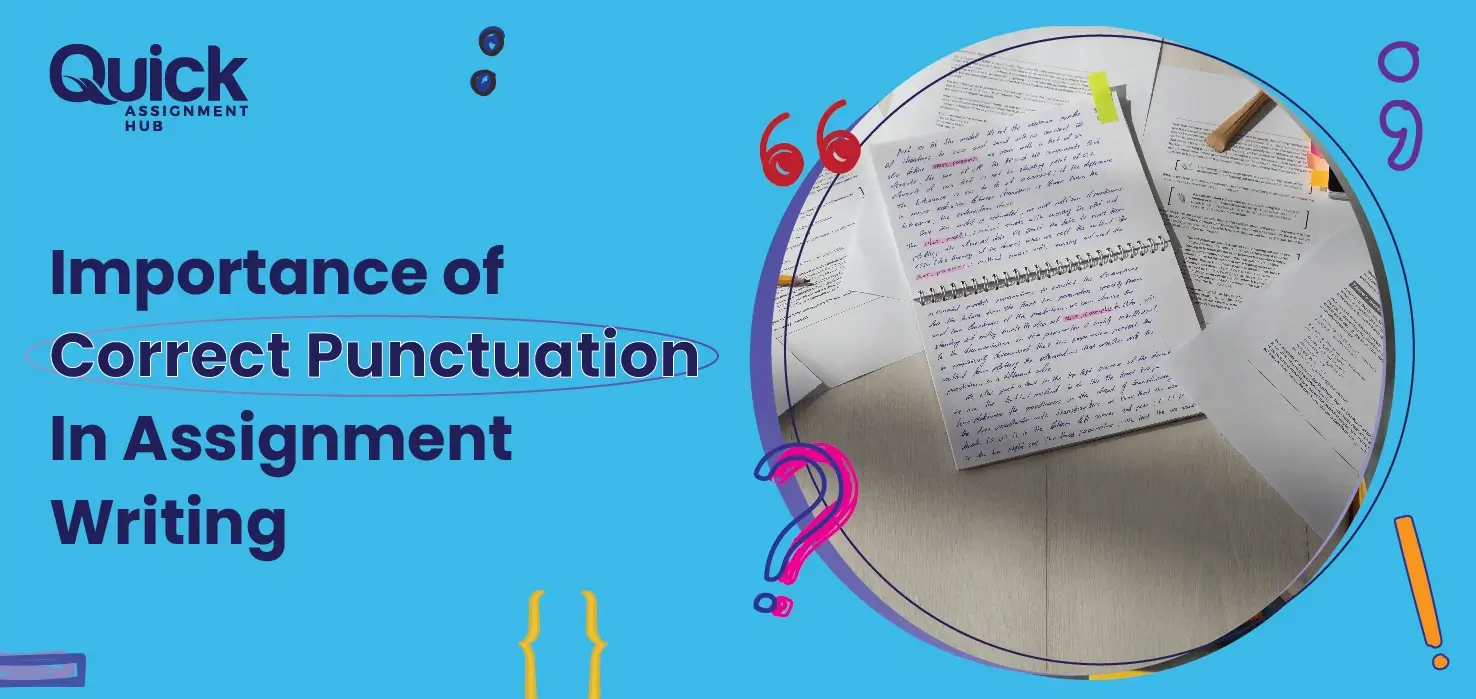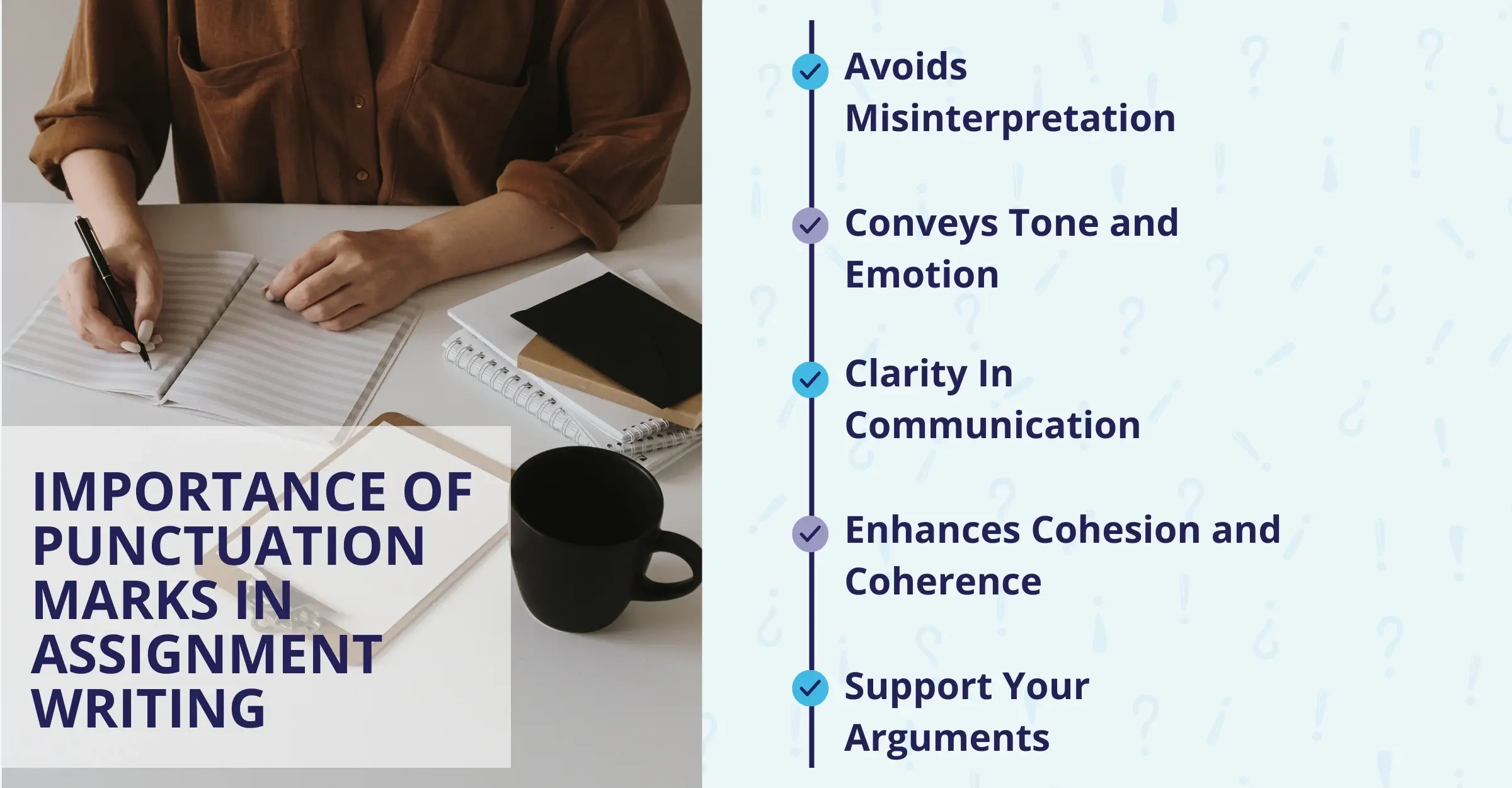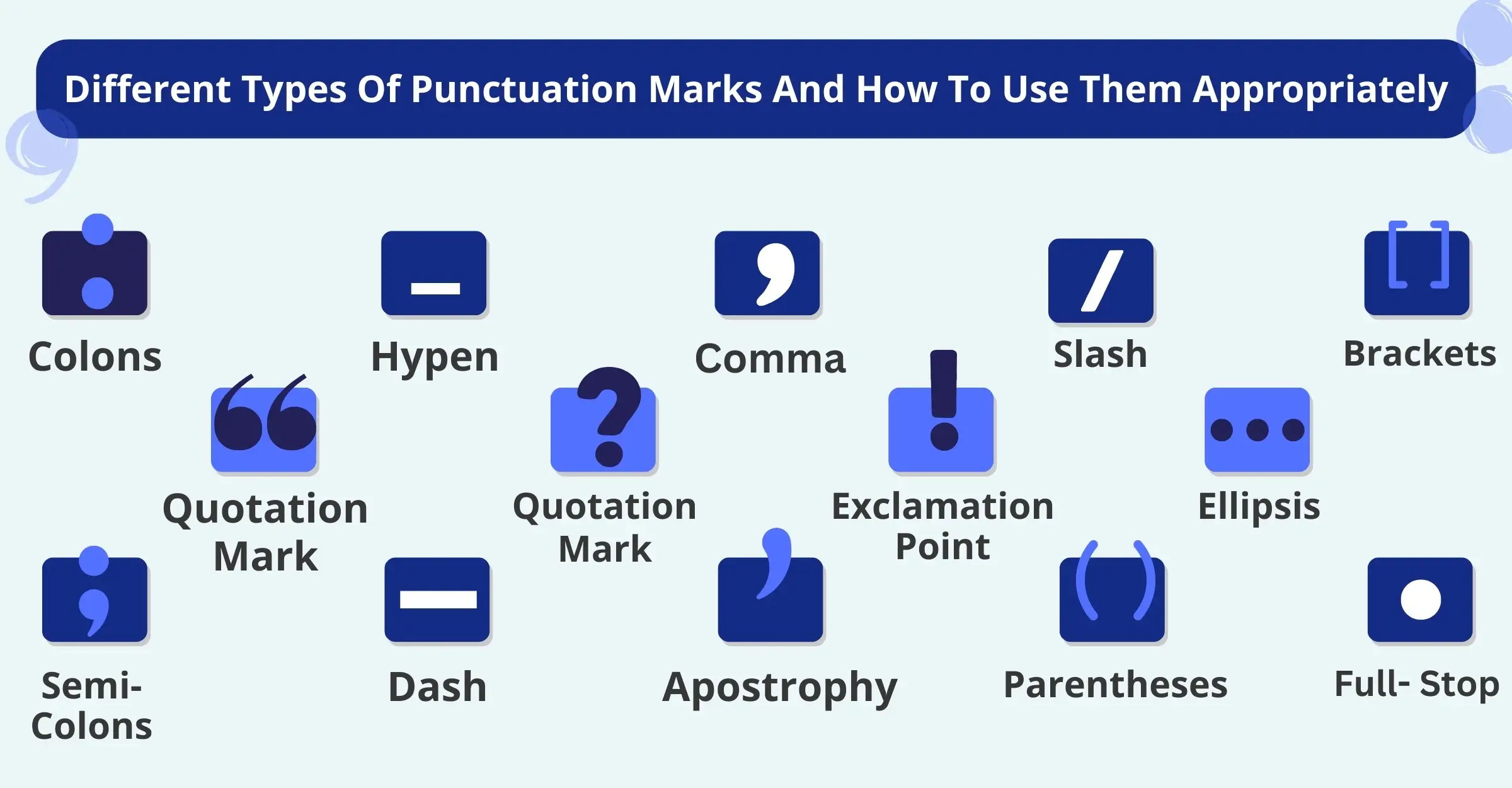
Imagine you are reading a book where sentences never end and thoughts that always run into each other. That's a world without punctuation. Punctuation fills our writing with a silent cadence. They are not just tiny symbols present to adorn your text but rather play a significant role in altering the meaning of a text. Like a well-composed song, correct punctuation adds rhythm to your writing.
Punctuation in assignment writing is more prominent because, without it, your writing can veer off course, leaving your readers needing to understand your message. Moreover, your credibility is at stake, and your paper may be labelled as unprofessional. In this blog, let's look at the importance of punctuation in writing, address confusing punctuation dilemmas and make your assignment stand out.
Punctuations are these tiny yet significant symbols that can break or make the meaning of your sentence. While other literary types of writing may leave liberty for punctuation marks, academic and assignment writing needs to be clear and concise.
Knowing how to punctuate sentences isn't just for dogmatism; it guides readers towards the intended meaning. It allows us to pause, stop, or emphasize certain parts of the sentence. Below are the reasons why punctuations in assignment are so crucial:-

With correct punctuation, the reader perceives the sentence and message as intended by the writer. A misplaced comma or an exclamation mark can alter the intended meaning, leading to misinterpretation.
Punctuation in writing emphasizes tone, ideas and emotions. For instance, an exclamation point can express excitement or urgency. Correct punctuation allows readers to read and feel the undertones of the sentence.
Punctuation in assignment helps strengthen your arguments and deliver clarity. They allow the reader to follow your flow of thought and ensure that your message is delivered effectively.
Correct punctuation brings words and texts together in a cohesive manner. It allows writers to organize and clarify ideas in writing by linking them when and as needed. Additionally, it clearly structures sentences and paragraphs, increasing the coherence of the text.
Your assignment is a reflection of your hard work. Correct punctuation in assignment ensures your arguments are precise and logical. A simple colon and semi-colon, for instance, articulate your argument so clearly. Punctuations bring attention to certain aspects of your arguments that need attention. The importance of punctuation in assignment writing is just the tip of the iceberg. You'll find more detailed examples in the blog below.
Your First Order
Get 20% OFF!
There are 14 punctuation marks in the English language. Applause if you can name them all in one go. We shall discuss only the most essential punctuations in writing with examples down below:-

One of the most used, and without one, it can leave the sentence awkward and hilarious to read. This punctuation in assignments is used for small pauses in the sentence or to group items i.
Examples:
Incorrect: The thief says the officer should be imprisoned.
Correct: The thief, says the officer, should be imprisoned.
Incorrect: Let's eat mom.
Correct: Let's eat, mom
Can you see the difference in the placement of commas that changed the sentence's meaning? Hilarious, isn't it? The mom should be aware!
Use commas to separate items in a list (college, universities, schools)
Use commas to separate independent and dependent clauses (When it snows, we build a snowman)
Use commas to avoid misinterpretation (Let's eat, Mom)
a. Oxford Comma (,)
The most overlooked and debated punctuation in writing is the Oxford comma. The Oxford comma is used after listing two or three things and placed before you list the last item.
Example: Yesterday, I bought a scarf, boots, coat, and socks. The sentence does not change its meaning, with or without the Oxford comma.
The following punctuation marks to discuss are sentence endings, which are used at the end of a sentence. Examples are full stop, exclamation point, and question mark.
a. Full Stop
Example: The sun rises in the east.
Use full stops for statements, facts and abbreviations.
b. Exclamation Point (!)
Exclamation points are used at the end of sentences to denote excitement like surprise or urgency like shouting.
Example:
Incorrect: Hi. I was so excited when you won yesterday. The sentence's tone reads as if you are just starting it and not really excited for the person.
Correct: Hi! I was so excited you won yesterday! The exclamation here denotes that you were indeed happy and excited.
Use in settings to denote surprise and excitement
Use in settings to denote amusement
Use in settings to denote screaming or shouting
c. Question Mark (?)
The question mark indicates a direct question.
Example: What time are you going to college?
Use at the end of an interrogative sentence
Dash and hyphen may look like similar punctuations in assignment, but are very different and are used to denote different meanings. A dash separates words and phrases or indicates a pause or a break. There are two types of dashes:-
a. Em Dash
Used to create a break in a sentence and add emphasis.
Example: She was running late— but she didn't forget the gift.
b. En Dash
A shorter than an em dash but longer than a hyphen, this is used to represent ranges or connections between values.
Example: The meeting will be held between 10.00–12.00 am
A hyphen is shorter than a dash and is used to connect words or parts of words.
Example: This is a five-star hotel.
A colon is used after a word to denote an explanation or examples.
Example: There are three things I need to do before exams: study, revise and practice.
Before an introduction of a list (The recipe has three ingredients: flour, sugar, and eggs)
Use to draw attention to something meaningful (There's one important life lesson: always be kind)
On the other hand, a semi-colon serves as a period and a comma. It is used to make a more potent pause than a comma between two closely related clauses.
Example: I missed the bus; I have to walk now.
Use for related clauses, without conjunction (She loves dogs; she has many dogs at home)
Use with conjunctive adverbs (He was tired; nevertheless, he finished his assignment)
Punctuation errors happen even to professionals in the field. As a student, it's only natural to make punctuation mistakes involuntarily. So, to minimize the occurrence of punctuation errors in your assignment writing, here are a few suggestions to avoid them:-
Focus on understanding the basic rules of punctuation in assignments. Learn the purpose and application of each punctuation mark, and having a grasp of these basics helps you write your sentences well.
Reading extensively is one of the most effective ways on how to improve punctuations in writing. As you read, pay attention to the context's sentence structures, tone and meaning. Over time, you'll sharpen your punctuation skills.
Leverage online tools like Grammarly to check your punctuation. These tools highlight your punctuation errors, and you can learn from them and improve. This will cancel out any errors of punctuation in assignment.
Writing assignments is a painstaking process, especially if students are juggling many other assignments simultaneously. We now know how vital punctuation in assignments is and why your professors are so stern about it. With expert assistance at Quick Assignment Hub, you will have a polished, professional assignment paper that will guarantee to impress your professor and keep those good grades in check.
We boast a team of highly qualified professional writers who have diverse knowledge about punctuation in assignments. Our proofreaders thoroughly proofread your assignments and run punctuation checks before they are delivered to you.
Plagiarism is one of the most significant violations of academic integrity, and our team of professionals only delivers original, grammatical-error-free assignments to students.
Our experts will confidently and effectively meet your challenges if you struggle with writing your arguments or want to know how to improve punctuation in writing.
Punctuations in assignments are vital aspects that play a role in conveying the intended message's tone, clarity and meaning to the reader. Correct punctuation in assignment helps prevent misinterpretation and add clarity to contexts. Just as language shapes how we communicate, punctuation shapes the quality of that communication. To master punctuation, students must practice regularly and try to understand their rules and applications to write their assignments seamlessly.
© Copyright Quick Assignment Hub All rights reserved.